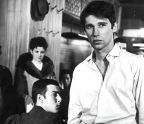No God But the Unknown

“Of course it was beautiful; but there was something more than beauty in it, something more stingingly splendid which had made beauty its handmaiden.”
—Jack London, Martin Eden
Pietro Marcello’s decade-long evolution from idiosyncratic film essayist to grand narrative storyteller represents one of the most significant artistic flowerings in contemporary cinema. Recently unveiled in competition at Venice, the Italian filmmaker’s fifth feature, Martin Eden, is momentous in ways that many Marcello enthusiasts may not expect: distinctly big, dramatic, and affecting, it confirms Marcello’s burgeoning talents and marks the belated arrival of a singular artist to the international art-house stage. More impressively, it does so without sacrificing the beauty, rigour, and intelligence that has built Marcello’s reputation as one of European cinema’s foremost fusionists. Indeed, one can draw a mostly straight line from the director’s early archival shorts and increasingly expansive hybrid features to the majestic storytelling sweep of this, his most ambitious project to date.
Based on Jack London’s 1909 novel, Martin Eden finds Marcello applying his wide range of art-historical reference points and flair for archival materials to a story of vast sociopolitical resonance. Whereas the director’s two previous features, The Mouth of the Wolf (2009) and Lost and Beautiful (2015), were rooted in documentary—and, indeed, only took on their respective narrative dimensions during the course of production, via a fortuitous encounter with the wayward protagonist of the former and the unexpected death of the latter’s original subject—Martin Eden operates from a wholly fictional foundation, albeit one reimagined to correspond with Marcello’s long-standing interest in the plight of Italy’s proletariat. To accomplish this, Marcello and his Lost and Beautiful cowriter Maurizio Braucci—who is also a former collaborator of Abel Ferrara (Pasolini, 2014) and Matteo Garrone (Gomorrah, 2008), as well as the recipient (along with Claudio Giavanessi and Roberto Saviano) of a Silver Bear for Best Screenplay at Berlin this year for Giavanessi’s Piranhas—have transposed London’s novel from early 20th-century Oakland to Naples in an unspecified moment in the decades surrounding WWI. In doing so, they’ve shifted the socioeconomic elements of the original story into a continuum of Italian modernism in which politics and aesthetics go hand in hand. Further, in freely adapting London’s novel, Marcello and Braucci have fashioned the title character into an emblem of the modern culture industry, whose neoliberal particulars London predicted with startling clarity.
The film follows Martin (played with an extraordinary combination of tenderness and ferocity by Luca Marinelli) from his early days as a lowly, uneducated sailor, through his years as a wide-eyed writer under the spell of bourgeois society, to his later life as a celebrated but bitter artist living in posh isolation. As
You’re reading a preview, subscribe to read more.
Start your free 30 days





